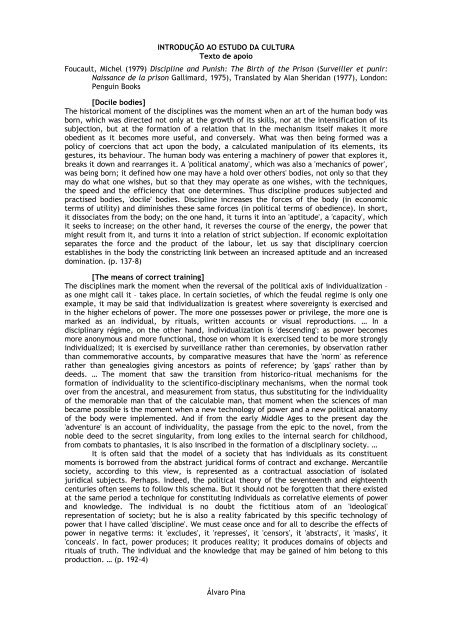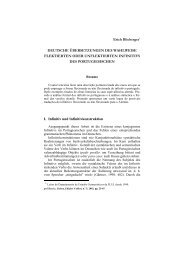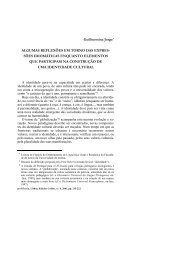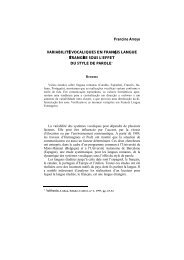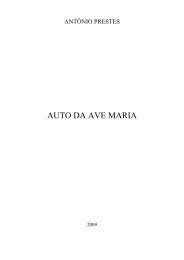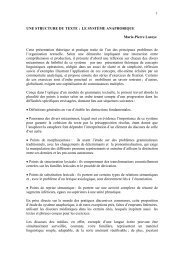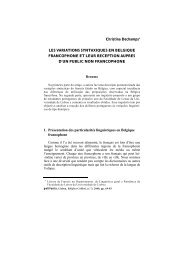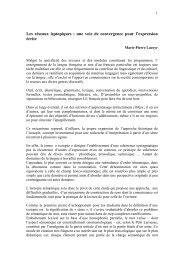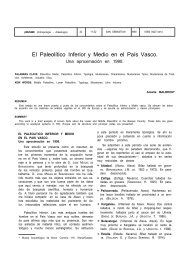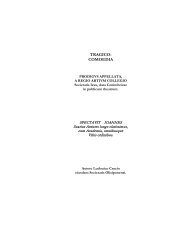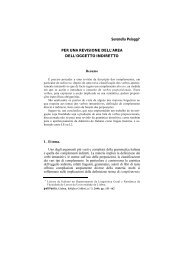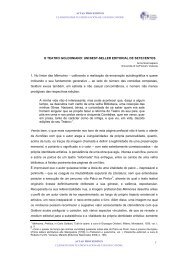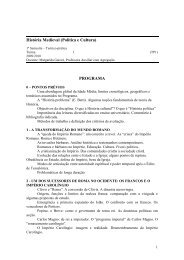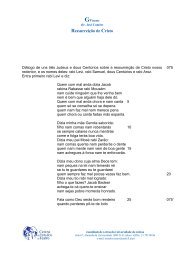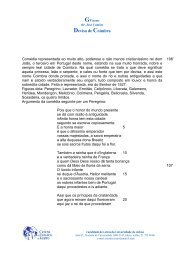Foucault, Michel (1979) Discipline and Punish: The Birth of the ...
Foucault, Michel (1979) Discipline and Punish: The Birth of the ...
Foucault, Michel (1979) Discipline and Punish: The Birth of the ...
You also want an ePaper? Increase the reach of your titles
YUMPU automatically turns print PDFs into web optimized ePapers that Google loves.
INTRODUÇÃO AO ESTUDO DA CULTURA<br />
Texto de apoio<br />
<strong>Foucault</strong>, <strong>Michel</strong> (<strong>1979</strong>) <strong>Discipline</strong> <strong>and</strong> <strong>Punish</strong>: <strong>The</strong> <strong>Birth</strong> <strong>of</strong> <strong>the</strong> Prison (Surveiller et punir:<br />
Naissance de la prison Gallimard, 1975), Translated by Alan Sheridan (1977), London:<br />
Penguin Books<br />
[Docile bodies]<br />
<strong>The</strong> historical moment <strong>of</strong> <strong>the</strong> disciplines was <strong>the</strong> moment when an art <strong>of</strong> <strong>the</strong> human body was<br />
born, which was directed not only at <strong>the</strong> growth <strong>of</strong> its skills, nor at <strong>the</strong> intensification <strong>of</strong> its<br />
subjection, but at <strong>the</strong> formation <strong>of</strong> a relation that in <strong>the</strong> mechanism itself makes it more<br />
obedient as it becomes more useful, <strong>and</strong> conversely. What was <strong>the</strong>n being formed was a<br />
policy <strong>of</strong> coercions that act upon <strong>the</strong> body, a calculated manipulation <strong>of</strong> its elements, its<br />
gestures, its behaviour. <strong>The</strong> human body was entering a machinery <strong>of</strong> power that explores it,<br />
breaks it down <strong>and</strong> rearranges it. A 'political anatomy', which was also a 'mechanics <strong>of</strong> power',<br />
was being born; it defined how one may have a hold over o<strong>the</strong>rs' bodies, not only so that <strong>the</strong>y<br />
may do what one wishes, but so that <strong>the</strong>y may operate as one wishes, with <strong>the</strong> techniques,<br />
<strong>the</strong> speed <strong>and</strong> <strong>the</strong> efficiency that one determines. Thus discipline produces subjected <strong>and</strong><br />
practised bodies, 'docile' bodies. <strong>Discipline</strong> increases <strong>the</strong> forces <strong>of</strong> <strong>the</strong> body (in economic<br />
terms <strong>of</strong> utility) <strong>and</strong> diminishes <strong>the</strong>se same forces (in political terms <strong>of</strong> obedience). In short,<br />
it dissociates from <strong>the</strong> body; on <strong>the</strong> one h<strong>and</strong>, it turns it into an 'aptitude', a 'capacity', which<br />
it seeks to increase; on <strong>the</strong> o<strong>the</strong>r h<strong>and</strong>, it reverses <strong>the</strong> course <strong>of</strong> <strong>the</strong> energy, <strong>the</strong> power that<br />
might result from it, <strong>and</strong> turns it into a relation <strong>of</strong> strict subjection. If economic exploitation<br />
separates <strong>the</strong> force <strong>and</strong> <strong>the</strong> product <strong>of</strong> <strong>the</strong> labour, let us say that disciplinary coercion<br />
establishes in <strong>the</strong> body <strong>the</strong> constricting link between an increased aptitude <strong>and</strong> an increased<br />
domination. (p. 137-8)<br />
[<strong>The</strong> means <strong>of</strong> correct training]<br />
<strong>The</strong> disciplines mark <strong>the</strong> moment when <strong>the</strong> reversal <strong>of</strong> <strong>the</strong> political axis <strong>of</strong> individualization –<br />
as one might call it – takes place. In certain societies, <strong>of</strong> which <strong>the</strong> feudal regime is only one<br />
example, it may be said that individualization is greatest where sovereignty is exercised <strong>and</strong><br />
in <strong>the</strong> higher echelons <strong>of</strong> power. <strong>The</strong> more one possesses power or privilege, <strong>the</strong> more one is<br />
marked as an individual, by rituals, written accounts or visual reproductions. … In a<br />
disciplinary régime, on <strong>the</strong> o<strong>the</strong>r h<strong>and</strong>, individualization is 'descending': as power becomes<br />
more anonymous <strong>and</strong> more functional, those on whom it is exercised tend to be more strongly<br />
individualized; it is exercised by surveillance ra<strong>the</strong>r than ceremonies, by observation ra<strong>the</strong>r<br />
than commemorative accounts, by comparative measures that have <strong>the</strong> 'norm' as reference<br />
ra<strong>the</strong>r than genealogies giving ancestors as points <strong>of</strong> reference; by 'gaps' ra<strong>the</strong>r than by<br />
deeds. … <strong>The</strong> moment that saw <strong>the</strong> transition from historico-ritual mechanisms for <strong>the</strong><br />
formation <strong>of</strong> individuality to <strong>the</strong> scientifico-disciplinary mechanisms, when <strong>the</strong> normal took<br />
over from <strong>the</strong> ancestral, <strong>and</strong> measurement from status, thus substituting for <strong>the</strong> individuality<br />
<strong>of</strong> <strong>the</strong> memorable man that <strong>of</strong> <strong>the</strong> calculable man, that moment when <strong>the</strong> sciences <strong>of</strong> man<br />
became possible is <strong>the</strong> moment when a new technology <strong>of</strong> power <strong>and</strong> a new political anatomy<br />
<strong>of</strong> <strong>the</strong> body were implemented. And if from <strong>the</strong> early Middle Ages to <strong>the</strong> present day <strong>the</strong><br />
'adventure' is an account <strong>of</strong> individuality, <strong>the</strong> passage from <strong>the</strong> epic to <strong>the</strong> novel, from <strong>the</strong><br />
noble deed to <strong>the</strong> secret singularity, from long exiles to <strong>the</strong> internal search for childhood,<br />
from combats to phantasies, it is also inscribed in <strong>the</strong> formation <strong>of</strong> a disciplinary society. …<br />
It is <strong>of</strong>ten said that <strong>the</strong> model <strong>of</strong> a society that has individuals as its constituent<br />
moments is borrowed from <strong>the</strong> abstract juridical forms <strong>of</strong> contract <strong>and</strong> exchange. Mercantile<br />
society, according to this view, is represented as a contractual association <strong>of</strong> isolated<br />
juridical subjects. Perhaps. Indeed, <strong>the</strong> political <strong>the</strong>ory <strong>of</strong> <strong>the</strong> seventeenth <strong>and</strong> eighteenth<br />
centuries <strong>of</strong>ten seems to follow this schema. But it should not be forgotten that <strong>the</strong>re existed<br />
at <strong>the</strong> same period a technique for constituting individuals as correlative elements <strong>of</strong> power<br />
<strong>and</strong> knowledge. <strong>The</strong> individual is no doubt <strong>the</strong> fictitious atom <strong>of</strong> an 'ideological'<br />
representation <strong>of</strong> society; but he is also a reality fabricated by this specific technology <strong>of</strong><br />
power that I have called 'discipline'. We must cease once <strong>and</strong> for all to describe <strong>the</strong> effects <strong>of</strong><br />
power in negative terms: it 'excludes', it 'represses', it 'censors', it 'abstracts', it 'masks', it<br />
'conceals'. In fact, power produces; it produces reality; it produces domains <strong>of</strong> objects <strong>and</strong><br />
rituals <strong>of</strong> truth. <strong>The</strong> individual <strong>and</strong> <strong>the</strong> knowledge that may be gained <strong>of</strong> him belong to this<br />
production. … (p. 192-4)<br />
Álvaro Pina
INTRODUÇÃO AO ESTUDO DA CULTURA<br />
Texto de apoio<br />
[Panopticism]<br />
<strong>The</strong> public execution was <strong>the</strong> logical culmination <strong>of</strong> a procedure governed by <strong>the</strong> Inquisition.<br />
<strong>The</strong> practice <strong>of</strong> placing individuals under 'observation' is a natural extension <strong>of</strong> justice imbued<br />
with disciplinary methods <strong>and</strong> examination procedures. Is it surprising that <strong>the</strong> cellular prison,<br />
with its regular chronologies, forced labour, its authorities <strong>of</strong> surveillance <strong>and</strong> registration, its<br />
experts in normality, who continue <strong>and</strong> multiply <strong>the</strong> functions <strong>of</strong> <strong>the</strong> judge, should have<br />
become <strong>the</strong> modern instrument <strong>of</strong> penality? Is it surprising that prisons resemble factories,<br />
schools, barracks, hospitals, which all resemble prisons? (p. 227-8)<br />
Álvaro Pina


